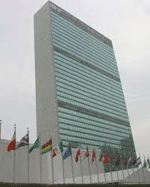Social Watch News
| Published on Fri, 2013-09-13 10:21 |
| Source: . Published on Fri, 2013-09-13 00:00 |
Published on Thu, 2013-09-12 19:24
This historic ILO Convention gives domestic workers the same rights as other workers. The International Labour Organization’s Domestic Workers Convention, 2011 (No. 189)comes into force on 5 September 2013, extending basic labour rights to domestic workers around the globe. |
Published on Thu, 2013-09-12 00:00
The long awaited work of an experts' committee on sustainable development financing, a key outcome of the Rio+20 United Nations conference, has finally started. The Intergovernmental Committee of Experts on Sustainable Development Financing held its first session on 28-30 August at the UN headquarters in New York. However, contrary to most multilateral discussions and intergovernmental processes in the UN, the session was closed not only to external stakeholders but also the Member States that are not part of the Committee membership of 30 states. |
Published on Wed, 2013-09-11 22:29
We, members and partners of the Asia Development Alliance (ADA) composed of national and sub-national development CSO/NGO platforms in Asia, participating in the 2nd Regional Consultation on Post-2015 development agenda, convened jointly with Global Call to Action against Poverty (GCAP)-Asia in Bangkok, Thailand on 25 August 2013, Recognizing the importance of the Post 2015 Development Agenda as an opportunity and challenge to CSOs in Asia to empower people living in poverty and insecurity to claim their own rights, |
| Source: . Published on Wed, 2013-09-11 00:00 |
Published on Mon, 2013-09-09 00:00
The human rights impacts of fiscal and tax policy will be the subject of an upcoming report by the Special Rapporteur on Human Rights and Extreme Poverty. The report, to be presented in June of next year (at the 26th session of the United Nations Human Rights Council) comes on the throes of growing scrutiny of economic policies by human rights advocates and will likely be welcome not just by them, but also by organizations that work on tax justice and revenue transparency issues and will draw reassurance from seeing their concern become a human rights issue. |
Published on Sun, 2013-09-08 00:00
“Despite the global progress with regards to literacy, disadvantaged populations and individuals are still excluded from quality learning provision” concludes the Global Report for Adult Learning and Education. The report, titled “Rethinking Literacy” was launched in Amman, Jordania on 8th September 2013 and it places a special focus on adult literacy as a foundation for adult learning and education, in addition to other topics such as promoting, financing and conducting quality assurance for adult education programmes and strategies. Carolyn Medel-Anonuevo, from UNESCO's Institute for Lifelong Learning pointed out that "literacy courses are only the first step to lifelong learning and that they should prepare people for future learning by encouraging skills to critically analyse information and take decisions." |
|
Published on Sat, 2013-09-07 17:19
» |
|
Published on Thu, 2013-09-05 22:09
A consortium of civil society organisations (CSOs) of which Women for a Change is part, has reiterated its call on government to suspend the current non-governmental organisation (NGO) registration exercise and immediately initiate a process to repeal the Act. The civil society organisations said they will remain resolute and unshaken to any innuendos and manoeuvres by any section of society to force them to be registered under an instrument that they claim was aimed at ‘killing’ the country’s democratic liberty. |
SUSCRIBE TO OUR NEWSLETTER









